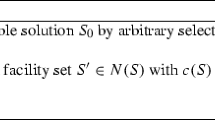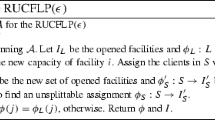Abstract
The uniform bounded facility location problem (UBFLP) seeks to the optimal way of locating facilities to minimize total costs (opening costs plus routing costs), while the maximal routing costs of all clients are at most a given bound d. After building a mixed 0-1 integer programming model for UBFLP, the paper gives lnn+1-approximation algorithm for UBFLP on general graph. Then, we present the first constant-factor approximation algorithm with an approximation guarantee of 6.853 + ε for UBFLP on plane, which is composed of the algorithm by Dai and Yu [1] and the schema of Xu and Xu [2].
Access this chapter
Tax calculation will be finalised at checkout
Purchases are for personal use only
Preview
Unable to display preview. Download preview PDF.
Similar content being viewed by others
References
Dai, D., Yu, C.: A 5+ε-approximation algorithm for minimum weighted dominating set in unit disk graph. Theoretical Computer Science (2008), doi:10.1016/j.tcs.2008.11.015
Xu, G., Xu, J.: An improved approximation algorithm for uncapacitated facility location problem with penalties. Journal of Combinatorial Optimization 17, 424–436 (2008)
Charikar, M., Khuller, S., Mount, D. Narasimhan, G.: Algorithms for facility location problems with outliers. In: Proceedings of the symposium on discrete algorithms, pp. 642–651 (2001)
Shomys, D., Tardos, É., Aardal, K.: Approximation algorithms for facility location problems. In: Proceedings of STOC, pp. 265–274 (1997)
Sviridenko, M.: An improved approximation algorithm for the metric uncapacitated facility location. In: Proceedings of IPCO, pp. 240–257 (2002)
Chudak, F., Shomys, D.: Improved approximation algorithms for the uncapacitated facility location problem. SIAM J. Comput. 33, 1–25 (2003)
Jain, K., Mahdian, M., Saberi, A.: Approximation algorithms for metric facility location and k-median problems using the primalCdual
Charikar, M., Guha, S.: Improved combinatorial algorithm for facility location problems. SIAM J. Comput. 34, 803–824 (2005)
Mahdian, M., Ye, Y., Zhang, J.: Approximation algorithms for metric facility location problems. SIAM J. Comput. 36, 411–432 (2006)
Byrka, J.: An optimal bifactor approximation algorithm for the metric uncapacitated facility location problem. In: Charikar, M., Jansen, K., Reingold, O., Rolim, J.D.P. (eds.) RANDOM 2007 and APPROX 2007. LNCS, vol. 4627, pp. 29–43. Springer, Heidelberg (2007)
Byrka, J., Aardal, K.: The approximation gap for the metric facility location problem is not yet closed. Oper. Res. Lett. (2006)
Feige, U.: A Threshold of ln n for Approximating Set Cover. J. ACM 45, 634–652 (2006)
Ambühl, C., Erlebach, T., Mihalák, M., Nunkesser, M.: Constant-factor approximation for minimum-weight (Connected) dominating sets in unit disk graphs. In: Díaz, J., Jansen, K., Rolim, J.D.P., Zwick, U. (eds.) APPROX 2006 and RANDOM 2006. LNCS, vol. 4110, pp. 3–14. Springer, Heidelberg (2006)
Huang, Y., Gao, X., Zhang, Z., Wu, W.: A better constant-factor approximation for weighted dominating set in unit disk graph. J. Comb. Optim., 1573–2886 (2008)
Berman, O., Yang, E.K.: Medi-center location problems. Journal of the Operational Research Society 42, 313–322 (1991)
Choi, I.C., Chaudhry, S.S.: The p-median problem with maximum distance constraints: a direct approach. Location Science 1, 235–243 (1993)
Piotr, K., Roberto, S.: Approximation algorithms for bounded facility location problems. Journal of Combinatorial Optimization 5, 233–247 (2001)
Author information
Authors and Affiliations
Editor information
Editors and Affiliations
Rights and permissions
Copyright information
© 2011 Springer-Verlag Berlin Heidelberg
About this paper
Cite this paper
Weng, K. (2011). Approximation Algorithm for the Uniform Bounded Facility Problem. In: Atallah, M., Li, XY., Zhu, B. (eds) Frontiers in Algorithmics and Algorithmic Aspects in Information and Management. Lecture Notes in Computer Science, vol 6681. Springer, Berlin, Heidelberg. https://doi.org/10.1007/978-3-642-21204-8_5
Download citation
DOI: https://doi.org/10.1007/978-3-642-21204-8_5
Publisher Name: Springer, Berlin, Heidelberg
Print ISBN: 978-3-642-21203-1
Online ISBN: 978-3-642-21204-8
eBook Packages: Computer ScienceComputer Science (R0)




